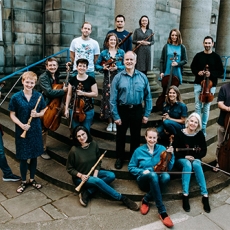Bach Mass in B Minor - Dunedin Consort - International Record Review
Between December 31st, 1981 and January 11th, 1982, Joshua Rifkin set the cat among the pigeons with the first-ever recording of the B minor Mass featuring one singer per part. Twenty-seven years on, the cat, now perceptibly ageing, is still there. So are most of the pigeons. It seems unlikely that Rifkin's theories, particularly when translated into performance, will ever be less than controversial. At the same tome, they have never been convincingly refuted, and a significant number of noted conductors (including the present one) have followed his example, with varying degrees of fidelity. Andrew Parrott went one better and devoted a whole book to the subject. Rifkin's theory, it should be emphasized, embraced the whole of Bach's choral output, not only the B minor Mass. When he first put forward his ideas, he was prevented by hostile audience reaction from completing his presentation. How frightened we are by the new. How proprietorial of the past. A quarter-century after the initial brouhaha, he produced, in John Butt's words, ‘the first truly scholarly edition of the Mass as Bach left it on his death in 1750'. It is this edition, published by Breitkopf & Härtel in 2006, which is recorded here for the first time.
As in politics, there will always be tensions between doctrinaire and ‘liberal' musicologists. For some, the arguments stand or fall on purely historical grounds, effectively independent of their realization in sound. For others, the ultimate proof of the pudding will be in the hearing. Never mind the scholarly evidence, pro or con; the only test that really matters, to all but ‘purists' of academic inclination, has got to be performance. Nor can performance as such, being both infinitely subtle, be anything like an unequivocal arbiter, proving or disproving the theory or theories behind it. Two interpretations hypothetically informed by identical intentions and dedicated to vindicating identical doctrines can differ fundamentally in effect, even when their tempos, their intended rhythmic profiles, their disposition of forces are identical. Above a certain level, the relative success or failure of any performance can be, indeed almost inevitably will be, determined by matters of milliseconds, mini-decibels and microtones - matters immeasurably too subtle to be communicated either by words (historical treatises, etc) or by our woefully inadequate notation, which remains in the nature of a blueprint. Nor, of course, is subjectivity by any means confined to the interpreter. It applies equally to listeners, whose reactions to a particular voice, rhythmic inflexion, instrumental colour, etc. may affect them very powerfully without their necessarily being able to explain why. Nor is this in any way a matter of sophistication. The effusions or brickbats of critics or musicians must always be taken with many pinches of salt. The concept of a definitive performance, of anything, flies in the face of music's very nature. All music is susceptible to numerous equally valid interpretations, their validity transcending the limits of time and place. The Bach playing of Pablo Casals or Edwin Fischer is no less profound, beautiful or musical for not being historically ‘correct'.
Fifty years or so ago, a much-heralded pianist made his debut in New York's Carnegie Hall. The audience read, so to speak, like a Who's Who of western musicians - particularly, of course, of pianists. Their verdict at the end boxed the compass. Flanking a rapturous middle ground were idolators and detractors of equall passion, ranging in their judgements from ‘the greatest pianist ever to grace these shores' to ‘the greatest fraud ever perpetrated against the American musical public'. When the same pianist made his London debut some time later, Neville Cardus, the doyen of British critics, expressed surprise that such a figure should have been invited to play in London, which, he observed, already had plenty of second-rate pianists of its own. The mediocrity in question was a Russian. One Sviatoslav Richter. Later in that decade, a regular feature of Royal Festival Hall programme booklets amusingly (and importantly) juxtaposed diametrically opposite judgements by critics covering exactly the same concerts, records, productions, etc. It was ever thus. You pays your money and you takes your choice.
Like Joshua Rifkin, Butt is both a distinguished scholar (specializing, though not exclusively, in Bach) and a widely admired performer. His artistic and scholastic integrity, like those of his carefully chosen quintet of admired soloists here, are beyond question. Small wonder, then, that his extensive and detailed booklet note is as readable, informative and thought-provoking as you could hope to find - a fully worthy companion to the CDs it accompanies.
That said, and despite its impeccable credentials, there are aspects of this predominantly outstanding performance that leave me feeling an outsider. Most of them boil down to rhythm. While the articulation is admirably clear, and musicologically enlightened (Butt's doctoral thesis was precisely on this subject), much of the rhythmic momentum, which would otherwise have a buoyant effect - essential to virtually all of Bach in my view - is blunted by a pervasive sameness of emphasis (back to those mini-decibels) which imparts, to my ears, an obviously unintended sense of dragging. Here we are again in One Man's Meat land. Many other listeners, I'm sure, will have a quite different impression.
Colleagues whom I greatly respect, but whose perspectives I don't always share, have heard this release and expressed great enthusiasm for it. I can express intermittent enthusiasm (‘Gloria in excelsis', ‘Cum sancto Spiritu', ‘Et expecto', ‘Dona nobis pacem' ... all of them spine-tingling) and genuine, if regretfully qualified, admiration. This is historically informed music-making at an undeniably high level, complemented by an excellent recording - expect perhaps in some of the choruses, where a greater amplification of the singers might not have gone amiss.

